CURIOSITY AS A WAY OF LIFE
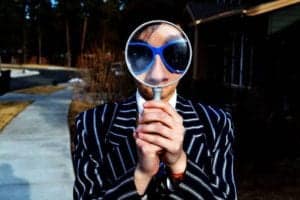 Would you describe yourself as curious? Just a wee bit? Or is your nickname Sherlock? Is curiosity a way of life for you?
Would you describe yourself as curious? Just a wee bit? Or is your nickname Sherlock? Is curiosity a way of life for you?
What is this trait, and from whence did it come? And how can curiosity be instrumental in a fulfilling creative life?
What is curiosity?
What’s the difference between curiosity, nosiness, and voyeurism?(Photo by Marten-Newhall on Unsplash)
We use all these words to describe the process of observing and asking questions. What’s this? What is going on? What happens, if…?” “If this happens, what do I do next?”
Voyeurism has grown in its usage from an unhealthy obsession watching others, often with sexual overtones, to its broader usage, describing one’s interest in general of other people’s behavior.
‘Nosiness’ is pretty close to this, implying prying into other’s affairs to learn things that one has no business knowing.
On juxtaposition with these two words, curiosity sounds almost holy.
Defined as a spirit of inquiry, curiosity is an underlying motivation to grow or be transformed.
Holy Curiosity and its Source in My life
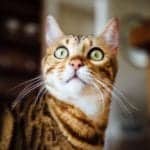 Having holy curiosity all my life is one of my core values and strengths.
Having holy curiosity all my life is one of my core values and strengths.
I say strength because curiosity has led me to take on challenges I would never have attempted if I hadn’t been so doggone curious as to what lay ahead. (Photo by Paul-Tanaka on Unsplash)
I suspect it may have been instilled and nurtured by my father, a science teacher, and lover of the land. He was always giving me an ‘if this, then what?’ challenge.
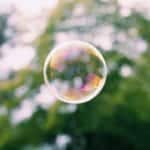 At three I was already curious about life. I learned about surface tension as we blew bubbles. (Photo by Brandon-McLeod on Unsplash)
At three I was already curious about life. I learned about surface tension as we blew bubbles. (Photo by Brandon-McLeod on Unsplash)
I soon learned that if I filled a glass full of water, I could carefully add another drop and create a level of water higher than the edge of the glass.
At five, I helped my dad sprout beans in a wet paper towel.
We put one rolled-up towel on the window sill and dampened it daily. We put one in the freezer and another on the floor register, where it promptly dried out.
Sometimes his answers to my never-ending questions may have arisen from his desire for me be quiet for a moment.
I remember asking, “What makes the wind blow”? I am sure I had distracted him from something important as he mumbled his reply, “The trees waving back and forth.” For years I would go walking in the woods, stare at the trees that were indeed waving their leaves in the breezes and wonder….
Questions as a Way to Think about Life
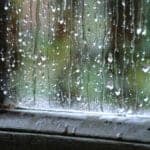 Many observations leave me wondering today. Questions are the way I think. They often lead to simple poetry as when I watched the rain against a windowpane.
Many observations leave me wondering today. Questions are the way I think. They often lead to simple poetry as when I watched the rain against a windowpane.
One thing I learned from the ‘cause of wind’ issue is that even though my premise about the cause of something may be totally off base, I can continue to observe, to listen, to roll around possible answers in my head.
And grow.
When I believe I have the solution to something, I stop thinking about it.
A door snaps shut in my brain as I move on to another question as if life were a multiple-choice exam. with only one correct answer. (Photo by Chris-Liverani on Unsplash)
It may be why we have so many factions in politics and religion.
When a question is asked, an ‘authority’ has the answer that makes as much sense as trees making the wind, and we never question its veracity.
Curiosity doesn’t bring many answers about life
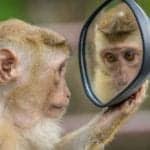
Often curiosity about life only brings on more questions. (Photo by Andre-Mouton on Unsplash)
My favorite questions are those that appear not to have any right answers.
Or perhaps there are too many possible answers. Common problems often begin with the classic SIX:
WHO? WHAT? WHERE? WHEN? WHY? HOW?
WHAT are my goals? WHAT is my purpose? “WHAT will happen if I….?”
Questions as the seed of creation.
WHAT happens if I mix mashed potatoes with a little blue paint and dry it in a mold? Did that once!
I learned there are better materials to use if I want to take up sculpting.
That is not the only thing that happened.
I felt the joy of working with my hands.
And I discovered that in art, there don’t have to be rules.
Wanting to know WHAT things look like at a macro level led me to take any course in college that had a microscope as I explored WHAT makes up the structure of life.
Today when I am in the kitchen, I often look for WHAT will make some leftovers taste fresh and spicy.
From WHERE do new ideas spring?
WHERE is the best place to take photographs?
WHERE do dreams originate?
WHERE does my inner guide live? In my heart? Liver? Cells? One of my Chakras or energy points?
WHERE questions lead us into the natural world as well as into the spiritual world.
WHERE is God exactly?
WHERE do we go when we die?
HOW do I catalog all the possible answers to these questions? HOW did I get to be this age? HOW do I continue to grow?
WHO is the best person to teach me what I want to know?
WHO has been down this trail before me? WHO loves me, and WHY?
The Biggest Question of All
Ahh…the biggest question of all. WHY? Why did this happen? WHY did it happen now? WHY is there suffering?

Our educational system has done many of us a disservice because it evaluates the effectiveness of its teaching with exams that have answers. It might be “a) b) c) or all of the above.”
If you, like me, are a victim of this kind of education, what do you do with these questions? (Photo by Chris-Liverani on Unsplash)
Living the Questions
Listen to these words of Rilke…
“Be patient toward all that is unsolved in your heart and
try to love the questions themselves, like locked rooms and like books
that are now written in a very foreign tongue.
Do not now seek the answers, which cannot be given you
because you would not be able to live them.
And the point is, to live everything.
Live the questions now.
Perhaps you will then gradually, without noticing it,
live along some distant day into the answer.” ―
I take these words to heart.
By living the questions instead of demanding that they all have answers leaves a door (and my heart) open to consider many options, to be transformed, and to discover things I never could if I am looking for the one ‘right’ answer.
You may want to consider Rilke’s advice this week as you bump into things you don’t understand or that pique your curiosity. Living the questions is as creative a lifestyle as one can enjoy!
DID YOU ENJOY THIS POST? WOULD YOU FORWARD IT TO A FRIEND? AND IF YOU HAVEN’T YET SIGNED UP FOR “SEEDS OF REFLECTION” I INVITE YOU TO DO THAT NOW SO WE CAN STAY IN TOUCH.
THANK YOU. Ardis Mayo


Dara Perfit
One of my students in my gifted program defined old age as “When you don’t want to laugh any more.” I think it is also when you don’t want to learn and explore any more – when curiosity is gone. When this happens, the world shrinks as does your sense of self and the value of you.
Too much can make the world shrink that is beyond our control but curiosity is within our power.
Ardis Mayo
Dara, Great insight into a marker for aging. I can’t help but wonder what the connection may be with dementia. It seems like the capacity to wonder and explore may be one of the first things to go. On the other hand, it may be residual curiosity that moves people with a cognitive loss to wander….
Peggy Day
I love the reflection in the mirror and return to it often. It makes me laugh. This is such a great website.
Peggy
Ps wanted to see if you get this?
Ardis Mayo
I assume you are referring to the monkey in the mirror! I’m glad you enjoy the website and the images. It is a labor of love.